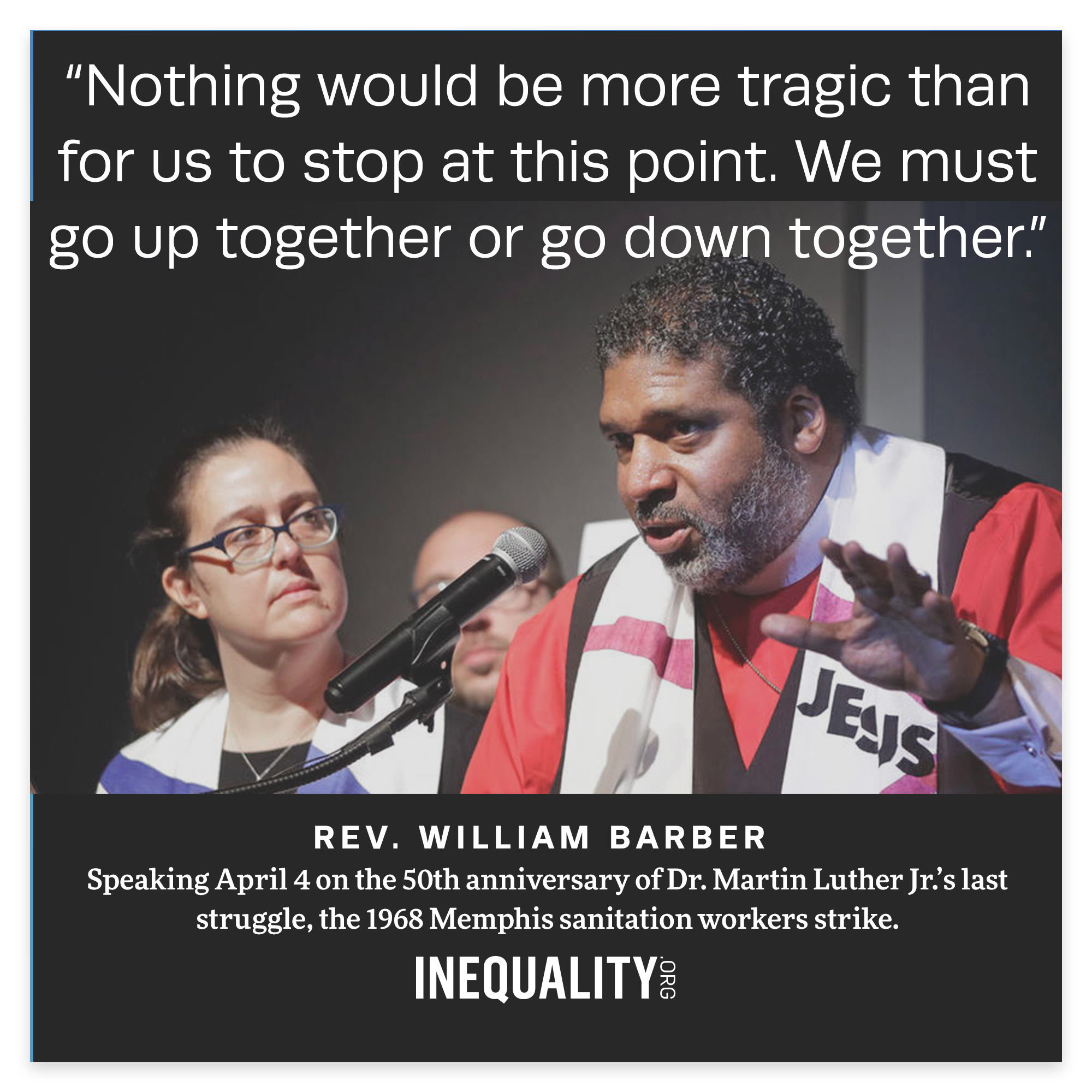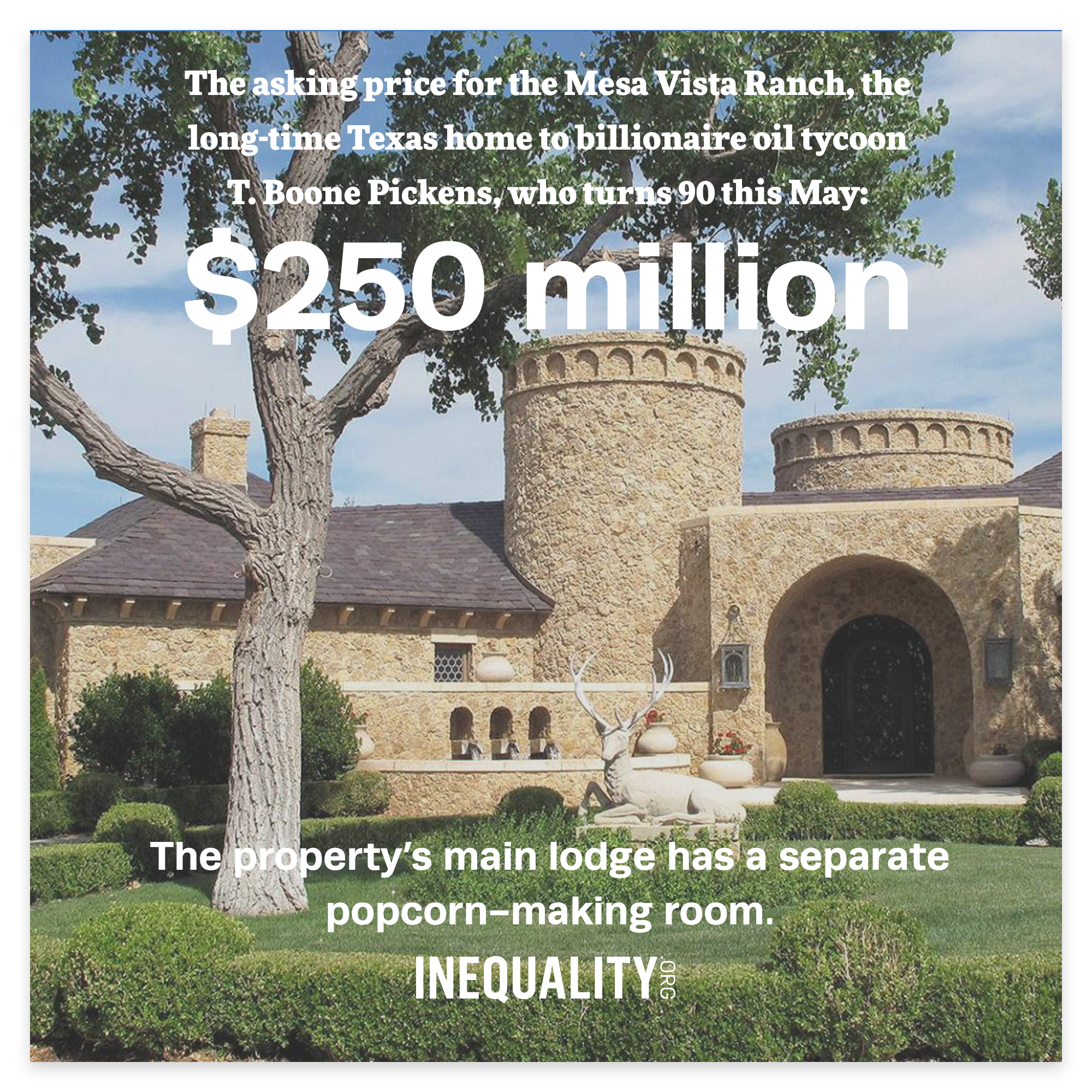Has inequality become inevitable? Dr. King certainly didn’t think so, and we shouldn’t either.
|
THIS WEEK
|
Fifty years ago, on the eve of his assassination, Dr. Martin Luther King, Jr. stood in Memphis, where sanitation workers were striking for better working conditions, and urged us all to build a new movement for economic justice. Noted Dr. King: “Nothing would be more tragic than to stop at this point in Memphis. We’ve got to see it through.”
After Dr. King’s death, organizers continued working to forge the transformative, multi-issue Poor People’s Campaign that Dr. King had envisioned. Fifty years later, racism, inequality, and militarism remain entrenched in our politics. My Institute for Policy Studies colleagues will be releasing a new report this week with the numbers that show why we so need to revive Dr. King’s campaign vision.
Economic inequality, the new IPS research finds, has accelerated in the years since 1968. Has inequality become inevitable? Dr. King certainly didn’t think so, and we shouldn’t either, a point I try to make in my new book, Is Inequality in America Irreversible? We have more on the book — and our contemporary struggles against inequality — in this week’s issue.
Chuck Collins, for the Institute for Policy Studies Inequality.org team |
|
|
|
|
INEQUALITY BY THE NUMBERS
|
 |
|
|
|
|
|
|
FACES ON THE FRONTLINES
|
 |
| Teacher Strikes About Far More than Fair Pay |
| Teachers across the United States are winning broad public support for rising up and demanding more for their profession and their communities. But high-ranking politicians are pushing back. In Kentucky, Governor Matt Bevin charged that teachers are displaying a “thug mentality.” Oklahoma Governor Mary Fallin likened her state’s protesting teachers to teenagers “wanting a better car.” Those sorts of put-downs from the powerful are just strengthening teacher resolve to expose the plutocrat-friendly premises that underlie how pols like Bevin and Fallin operate. Inequality.org co-editor Negin Owliaei has more on the struggle for educational justice. |
|
|
|
|
WORDS OF WISDOM
|
 |
|
|
|
|
|
PETULANT PLUTOCRAT
OF THE WEEK
|
 |
| A Media Mogul’s Fake Editorial on Fake News |
| Freedom of the press, media critic A.J. Liebling quipped years ago, only really belongs to “those who own one.” David Smith owns many more than one. His fiercely right-wing Sinclair Broadcasting now runs 173 local U.S. TV stations. Late last month, Sinclair ordered its local news anchors to recite on-air an editorial that essentially regurgitated Donald Trump’s attacks on the news media. Deadspin subsequently collected these recitations into a chilling video that quickly gained eight million views. A furious David Smith then harrumphed to the New York Times that “every word that comes out of the mouths of network news people is scripted and approved by someone.” Smith had earlier griped that America’s print media has become “so left wing as to be meaningless dribble.” A merger that would hand Sinclair over 40 additional stations is now awaiting regulatory approval, and one media watchdog group has just unveiled an imaginative ad campaign to stop this latest Sinclair power grab. |
|
|
|
|
GREED AT A GLANCE
|
 |
|
|
|
|
|
|
TOO MUCH
|
 |
| An Enlightening Tale of Taxes and Toys "R" Us |
| The orthodoxy that dominates today’s Republican Party — and the ranks of “business-friendly” Democrats — rests on a simple approach to economic policy. Let’s be nice, this orthodoxy holds, to rich people. Let’s be particularly nice at tax time. Let’s keep taxes on rich people, conservatives advise us, as low as possible. High taxes on high incomes, they argue, discourage entrepreneurship. This conservative take on taxes works wonderfully for sound bites — and totally muddies how our economy actually works. Consider, for instance, the story of Charles Lazarus and Toys “R” Us, the iconic global retailer that has just announced its impending demise after over a six-decade run. Inequality.org co-editor Sam Pizzigati has more. |
|
|
|
|
|
|
MUST READS
|
This week on Inequality.org
Andrew Leigh, Australian CEOs Admit They Won't Spend Tax Cuts on Jobs and Wages. New research from Australia shows that a lower effective tax rate matches up with a lower rate of job creation.
Thais Lazzeri, One Hundred Years of Servitude in Brazil. Since the days of the 19th century rubber barons, plantation bosses have exploited indigenous people in the Amazon.
Jessicah Pierre, King’s Dream Included Economic Equality, Too. The late leader didn't just criticize racial segregation. He called for an end to economic injustice.
Chuck Collins, Is Inequality in America Irreversible? A powerful analysis of how the plutocracy sold us a toxic and damaging lie, and what we can do to fight back.
Chuck Collins, White Amnesia and the Racial Wealth Divide. A conversation with Richard Rothstein about The Color of Law, his new book on the government’s role in segregating the United States.
Elsewhere on the web
Americans for Tax Fairness, Trump Tax Cut Truths. A searchable database tells us what corporations are doing with their tax savings.
Lisa Christensen Gee, Tax Cuts and Tax Shifts, Institute on Taxation and Economic Policy. Red-state lawmakers must not think teacher anger at school funding cuts amounts to much of a threat. The legislators are still pushing tax cuts for the wealthy.
John Irons and Xavier de Souza Briggs, Promoting Transparency and Fair Share in the Face of Growing Inequality, Stanford Social Innovation Review. To curb rising inequality, global leaders must work together to stop the flow of illicit wealth and mitigate tax avoidance.
Julian Vasquez Heilig, School Choice Exacerbating Inequality and Segregation, Cloaking Inequality. A review of an important new case study.
Matt Bruenig, Why we need social housing in the US, Guardian. An influx of publicly owned apartments would boost our housing supply and minimize the displacement caused by luxury developments.
Thomas Piketty, Brahmin Left vs Merchant Right: Rising Inequality and the Changing Structure of Political Conflict, World Income Database Working Paper. Without a strong egalitarian-internationalist platform, the evidence shows, progressives cannot unite low-income voters within the same party.
|
|
|
|
|